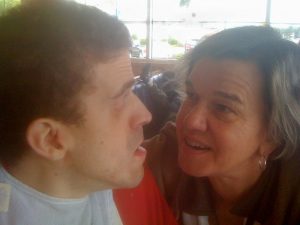The Difference Medicaid Makes for My Family
by Beth
Here’s another guest post about how changes in Medicaid could affect the people we love and care about. This one is written by my husband, Mike Knezovich.
by Mike Knezovich
Meet Gus, our son.

Our little man with his mom.
He’s 30. He laughs heartily when I sing to him in a Louis Armstrong voice. He loves music, especially stuff that has unusual rhythms—Prince is a favorite. He doesn’t seem to be able to see very well straight ahead, but he manages with his peripheral vision. And he knows Beth’s voice and my bearded face.
He can’t talk. He can kinda’ walk with assistance. And he wears diapers. He lives in a group home in Watertown, Wisconsin.
Gus was born with a genetic anomaly called trisomy 12-p. Pretty rare. The only literature we found at the time said he was unlikely to reach age 30. But he did. I’m proud of him. And of us. And of my fellow Americans who made it possible.
By the time Gus reached age 16 he was mobile and strong enough for it to be a safety issue for him and for us. We were lucky to find Bethesda Lutheran Communities. It’s a religiously affiliated non-profit that runs the group home our son lives in. It gets donations. But it can’t do what it does without help from the broader community—like Medicaid and other programs.
Gus needs help with everything. And he gets it. From salt-of-the-earth-people who make, essentially, the minimum wage. Medicaid helps pay for that. But barely enough. Bethesda is in the midst of financial struggles, as are lots of such agencies across the country.
Gus gets medical care from providers who accept Medicaid. It’s hard finding providers in some fields—like dentistry—but overall, compared to a couple of his housemates, he’s fortunate to not need a lot of specialists’ care.
I want you to trust me on this. I’m a pretty smart person. I love my son. I’ve watched closely. No one’s getting rich off of others’ labors in this equation.
Gus is served by a Wisconsin program called Family Care, which is essentially a kind of HMO for people like him. Family Care administers Medicaid funds and pays the group home operators, and oversees the operators, and looks after Gus’ care, and communicates with us about his health and any behavioral issues. Family Care does a very good job. We always hear pronto from Sarah, who’s a lead at the home where he lives, if anything is amiss with Gus.
Beth and I have always worked. We’ve paid a lot of taxes. But even if we were totally frugal, we couldn’t cover the cost of Gus’ care. And though we’re both sort of healthy, we haven’t been able to provide that care directly for a long while now.
I’ve worked at non-profits, at government-supported institutions of higher education, at startups, and at Fortune 500 companies. I’m here to tell you, they’re all a mess. They’re a collection of humans being humanly clumsy. They all rely on enough people trying to do the right thing. If not enough of those people are in the right places at the right time trying to do the right thing, failures ensue. Government. Private sector. Doesn’t matter.
There are worthwhile discussions to be had about the devils in the details of programs like Medicaid, Medicare, etc. I’m not a rigid ideologue. Everything can work better than it does.
But we’re not having that discussion anymore.
Awhile back I wrote an essay about how when bad things happen you can feel pretty alone. And about the value of understanding that you’re not.
Right now I’m feeling pretty alone. So are a boatload of other people.
I hope you’ll speak up and prove us wrong.
Join us in telling the U.S. Senate: No Cuts, No Caps to Medicaid. Start by calling your state senators to oppose the cuts and caps to Medicaid using our call script with additional talking points. Share stories, like this one, that show the impact of Medicaid on people with disabilities and their families. Also be sure to check out our Medicaid hub to learn more about the Senate health care bill.






